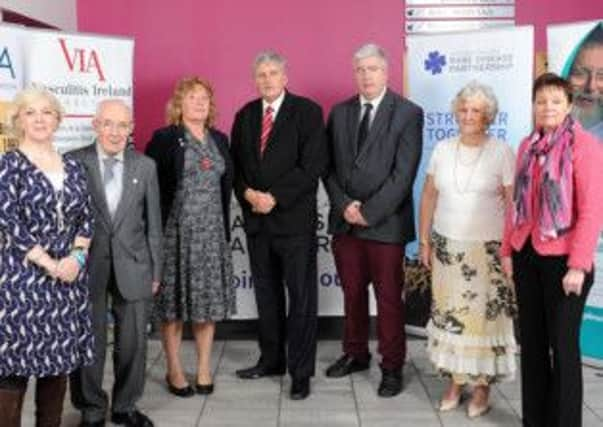Rare brain disease takes devastating toll on Stewartstown woman


Pam Cooke, whose 58-year-old sister Linda Crozier, was diagnosed with PSP in 2011 told the Mail how just 90 people in Northern Ireland have the disease, but, often mistaken for conditions such as Parkinsons and dementia, it can be difficult to diagnose.
Feeling there is a lack of support for those facing lesser-known conditions, Pam is backing Health Minister Jim Wells’s consultation on the draft Northern Ireland Rare Disease Implementation Plan, and said she hopes it will make life easier in future for families facing PSP.
Advertisement
Hide AdAdvertisement
Hide AdShe told the Mail: “Because we don’t have a voice like cancer or Parkinsons... we don’t have a lot of research or money or political involvement because there are so few people that suffer [from PSP].
“That’s why they have the Northern Ireland Rare Disease Partnership, so all these minority diseases or illnesses can come under that umbrella.”
Describing the effect this disease has had on her sister, Pam said: “It affects the tau protein in the brain, and it goes into clumps and starts to damage the nerves.
“When my sister was initially diagnosed back in 2011 she was diagnosed with Parkinsons - but the symptoms at the outset are very similar.”
Advertisement
Hide AdAdvertisement
Hide AdBut she added, due to the excellent work of neurologist Dr Forbes at Craigavon, the real cause of the problem was soon realised.
The news was not all good for Linda however, as PSP suffers are expected to live for just seven years after the disease takes hold, Pam said.
As well as balance problems, the progressive disease goes on to affect eyesight, before deteriorating the sufferer’s cognitive abilities.
“My sister has now lost the ability to write,” said Pam. “And she’s now losing her ability to speak.
Advertisement
Hide AdAdvertisement
Hide Ad“It’s very difficult for me to have a conversation with Linda, she’s actually in a home now, and she’ll just be 58 at the end of this month.
“Eventually, they lose the ability to swallow, then they have to be fed by tube, if that’s appropriate - It’s a very debilitating illness and it’s very sad, because I see how much my sister has deteriorated.” Linda, Pam went on to say “had a good sense of humour” before PSP and “always liked to have a good laugh”.
But now she describes someone whose “face becomes expressionless”.
“Not being able to talk is a major thing for her,” she went on, “at times she gets very frightened and insecure.
Advertisement
Hide AdAdvertisement
Hide Ad“She knows that she’s ill, [and] at times she can be very quiet and withdrawn.”
But the disease has also taken its toll on the family.
“Whenever you’re told somebody you love has a terminal illness and that there is a life-span... we were devastated,” Linda explained.
“It does take a lot out of you, and it does cause a lot of stress [when you see] somebody you care about suffering, and deteriorating slowly.
“You don’t think about next year, you just think about the here and now.”
For details, or to help, go to www.pspassociation.org.uk